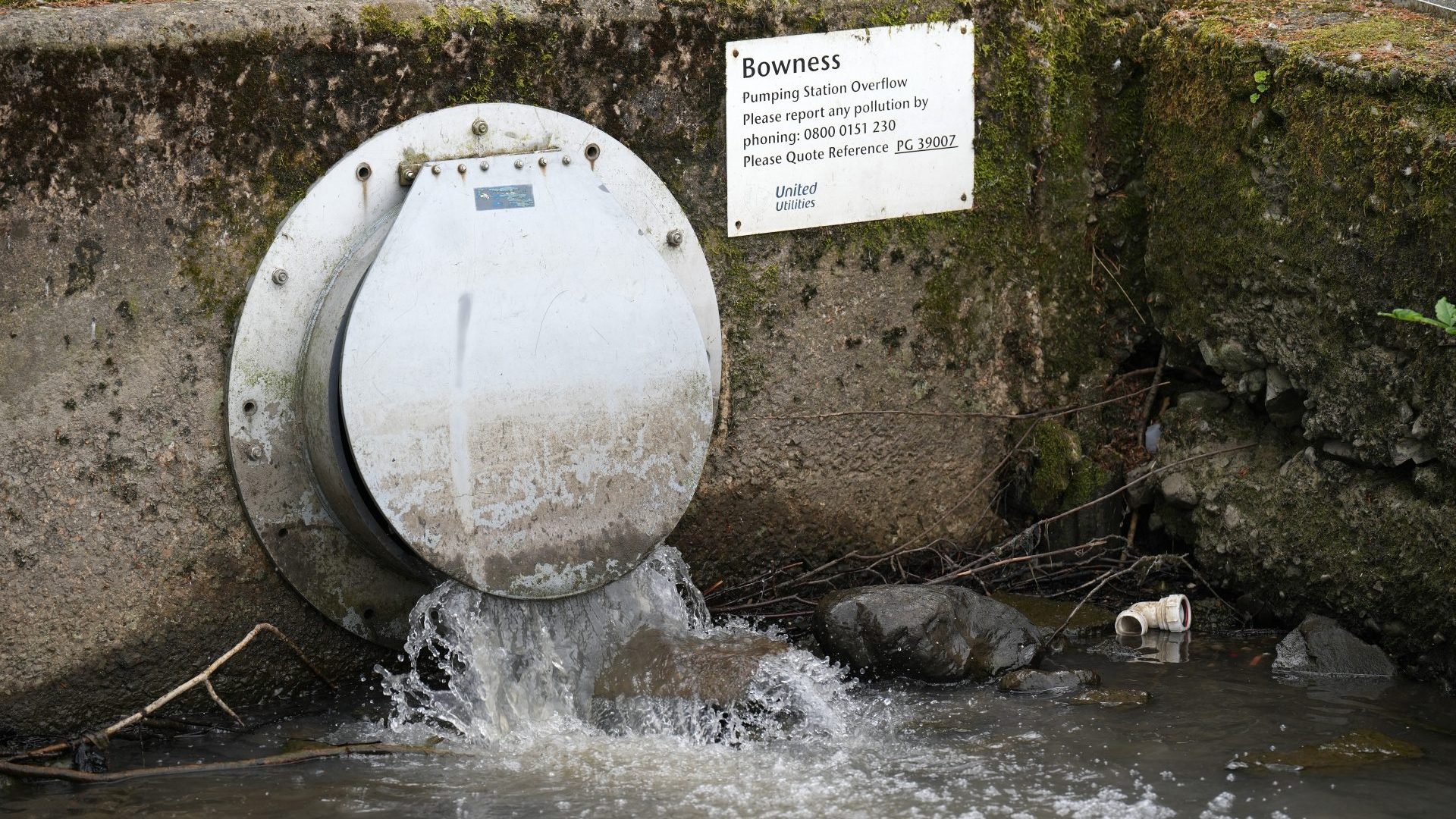Last year was the worst on record for water companies discharging raw sewage into England’s rivers and coastal waters, according to figures released by the Environment Agency. Untreated human waste spewed out of storm overflows for a combined total of 3.6 million hours, compared to 1.75 million in 2022.
The image of Britain wallowing in excrement is an apt metaphor for the state of the country after 14 years of Tory rule. But it is more than a metaphor: it is a symptom of a broken political and economic system.
Since privatisation in 1989, water companies have increased bills by 40%, taken on £56 billion of debt, and paid out £72bn to shareholders. Most of this money went to foreign investment firms, private equity, and pension funds.
The loosely regulated water companies did not make adequate investments in infrastructure. As much of the sewerage system in this country was built over a century ago, its capacity is regularly exceeded. When this happens, untreated human waste is released into rivers and sea to avoid this stinking sludge flooding homes, businesses and public places.
There are uncanny parallels between the present day and the mid-19th century when laissez-faire attitudes towards sanitation resulted in terribly polluted waterways. Eventually, the late Victorians got their act/shit together; but contemporary politicians are ignoring lessons from the past.
At the start of the 19th century, London was the only city in the UK with more than 100,000 inhabitants. As the Industrial Revolution got going, millions of people moved from the countryside to the towns in search of work.
By 1871, 18 towns had a population of more than 100,000. More than 3 million lived in London; over half a million in Liverpool and Glasgow with Manchester not far behind.
The mid-19th century was a time of wealth creation. The middle and upper classes poured enormous sums of money into companies that built the country’s train network during the ‘railway manias’ of the 1830s and 1840s.
Local government also played a role. As trains were considered crucial for towns’ prosperity and prestige, municipal politicians fell over themselves to help railway companies. Entire city centres were rebuilt to accommodate tracks, stations and yards.
At the same time, new industrial towns and cities lacked basic sanitation. The political and economic elites looked the other way as human waste oozed into streams and rivers, from which a patchwork of unregulated private companies drew drinking water.
Unsurprisingly, waterborne diseases killed enormous numbers of people. Cholera outbreaks occurred periodically between 1831 and 1866, condemning victims to a terrifyingly quick, painful death; but most mortality was the result of more common bugs that disproportionately affected children and new arrivals from the countryside.
As Cambridge-based historian Simon Szreter points out, despite unprecedented economic growth, national-level life expectancy lingered stubbornly at around 40 years between 1801 and 1871, dragged down by the horrendous state of health in urban slums. In the central areas of Manchester and Liverpool, life expectancy was around twenty-five.
The main impediment to improving urban sanitation was not technological or financial. It was a lack of political will.
The Great Reform Act of 1832 extended the franchise to the middle classes. A couple of years later the Municipal Corporations Act established local governments voted for by ratepayers.
The new electorate was dominated by small-scale entrepreneurs – shopkeepers and alike – who were staunchly opposed to being taxed, particularly when the funds were used to support what they saw as the undeserving poor. Consequently, the only electable governments were those committed to minimal taxation and limited state intervention.
As Szreter notes, it wasn’t until the Reform Act of 1867 and related legislation changed the political context again that sanitary reform became possible. All of a sudden, 60% of working-class men could vote in municipal elections. Local politicians were no longer in thrall to the small business owners.
A new political elite emerged: nonconformist industrialists who were influenced by the ‘civic gospel’, which emphasised the moral duty of the wealthy to improve the living conditions of the poor. They formed an alliance with the recently-enfranchised working classes, resulting in a new era of municipal activism and improvement.
Joseph Chamberlain – Neville’s father and the Mayor of Birmingham in the mid-1870s – pioneered a strategy for putting the civic gospel into practice. His city government took out long-term loans and used this money to build sewerage and water networks. At the same time, they created municipally-owned monopolies over this infrastructure, as well as gas, electricity and public transport. The profits from these enterprises were then used to pay off the loans.
Chamberlain’s approach proved to be economically viable and politically popular. Over the next couple of decades, the civic gospel spread, with most municipal governments across the country copying the Birmingham model.
Urban death rates tumbled, primarily due to a steep decline in waterborne infectious diseases. National-level life expectancy finally began to increase, reaching 60 by 1931.
Britain was a sanitation pioneer. In the last decades of the nineteenth century, Europe’s major cities built sewerage infrastructure and mortality from waterborne diseases declined sharply. There was one notable exception, however.
As another Cambridge-based historian, Richard Evans points out, the political structure of the Free and Hanseatic City of Hamburg was uniquely ill-suited to cope with the public health problems that came with industrialisation. At the end of the 19th century, the port had a population of 800,000 but was governed by a handful of powerful merchant families who were concerned with one thing: promoting and protecting trade.
Raw sewage poured into the Elbe, from which the population drew its drinking water. Unsurprisingly, cholera struck in summer 1892 – the last to hit a major European city. 10,000 people died in six weeks.
When Robert Koch, Germany’s top scientist, arrived in Hamburg to arrest the outbreak, he was shocked by the overcrowded and unsanitary conditions in which most people lived. “Gentlemen, I forget that I am in Europe,” he remarked. While this comment may betray a lack of respect for other cultures, it reveals how far Hamburg deviated from the continent’s other great cities in the continent.
When it comes to sanitation, the stakes are much lower now – the main risk is now getting sick while swimming – but Britain is no longer a leader. Many of the nation’s rivers and beaches are unsafe. Oxford and Cambridge Universities’ rowers have been warned not to enter the Thames when they finish this weekend’s Boat Race due to high levels of E. coli.
In contrast, European countries have reported significant improvement in water quality. Over the last three decades, the proportion of the continent’s swimming spots recording “excellent” water quality increased from 53% to 85%. It is even possible to swim in some European capitals, including Amsterdam, Berlin, Copenhagen and Vienna.
Britain’s shortcomings risk raising tensions with our European neighbours. In summer 2022, three French members of the European Parliament accused the UK of abandoning international environmental regulations and requested the European Commission do something to stop the Channel and North Sea being polluted.
The situation certainly hasn’t been helped by the UK’s exit from the European Union. In 2021, the Environment Agency responded to post-Brexit shortages of chemicals used in sewage treatment by granting water companies temporary permission to pump partially treated sewage into rivers and coastal waters.
Campaigners have expressed deep concerns that things will get worse as the Tory government doubles down on its laissez-faire approach and diverges from EU legislation. The European water framework directive required member states to test water quality every year but since 2016 the government only conducts these tests every three years. And less than two weeks ago, the EU finalised an update to the urban waste water treatment directive, which further tightened rules in the EU. The UK refuses to copy these changes.
In the European context, the British system of an entirely privatised water and sewerage system is unusual. In fact, elsewhere there has been a recent trend towards “remunicipalisation”. Two of the most prominent examples of this phenomenon are Paris in 2010 and Berlin in 2013; but privatised water services have been returned to full public ownership in hundreds of cities.
A whopping 69% of Britons are in favour of renationalising the water industry. Sadly, the main political parties do not share this sentiment.
Chamberlain remains a hero to centrist Tories, but bearing in mind their party’s rightward lurch over the last few years, it is hardly surprising the government continues to defend the status quo. It is more difficult to understand the Labour Party’s decision to renege on the Corbyn-era commitment to return water companies to public ownership.
Keir Starmer has accused the government of “turning Britain’s waterways into an open sewer” but argues that nationalisation is unaffordable in the current economic climate. So at the moment, the best that we can hope for is tighter regulation of private water companies and realignment with EU environmental legislation.
Jonathan Kennedy teaches at Queen Mary University London. His first book, Pathogenesis: How germs made history (Torva), is out in paperback now










